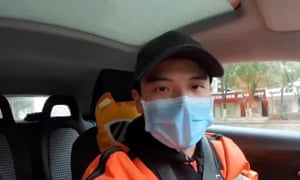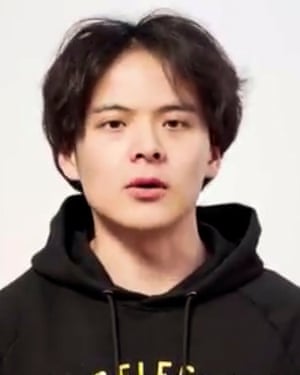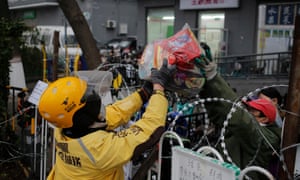‘They’re chasing me’: the journalist who wouldn’t stay quiet on Covid-19
Li Zehua is missing, presumed detained. He’s one of many for whom the coronavirus crisis has led to a political awakening and a demand for free speech

Li Zehua, 25, a citizen journalist in Wuhan, is being chased. Wearing a facemask underneath a baseball cap, he quickly records a video while driving. “I’m on the road and someone, I don’t know, state security, has started chasing me,” he says breathlessly. “I’m driving very fast. Help me.”
Later, Li posts a live stream of himself in an apartment, waiting for those same agents to knock on his door, probably to detain him. In an impassioned monologue, he explains why he quit a stable job at China’s state broadcaster, CCTV, and how he came to Wuhan on his own.
“I don’t want to remain silent, or shut my eyes and ears. It’s not that I can’t have a nice life, with a wife and kids. I can. I’m doing this because I hope more young people can, like me, stand up,” he says. The live stream, posted on Weibo, where it was later deleted, and on YouTube, shows two men in plain clothes entering the apartment and then cuts out.
As the number of new coronavirus infections inside China has slowed, authorities say the outbreak will reach its peak by the end of the month and any economic shock caused by an almost two-month nationwide shutdown will be limited. The propaganda machine has gone into overdrive, highlighting the government’s handling and the hard work of health workers and citizens.
But for many, especially young people like Li, the damage is done. A growing number have not only become disenchanted with their government, ruled by the powerful Communist party, but are calling for changes such as free speech and government accountability. Some are calling it a political awakening – a provocative term in a country where any sign of dissent is quickly shut down.

“In the past, I was afraid of running into trouble so I didn’t speak up much. Now I will speak out much more,” said Krejerk Liu, 30, who runs a bar in Beijing. He posts articles and opinions online and is increasingly critical of the government. “For me, being awake means I must keep speaking and keep seeing.”
More than 2,000 people have died from the virus in China, which has infected almost 80,000. Almost every citizen has been affected whether in Wuhan struggling to save a family member amid overrun hospitals, labyrinthine bureaucracy and supply shortages, or quarantined at home, worried about the virus and when their lives can return to normal. Anger at the authorities has only solidified, helped by a steady stream of accounts of desperate families and health workers in Wuhan, allegations of corruption among state-run charities, and videos and photos of ordinary residents abused by local authorities in the name of epidemic prevention.
The financial news outlet Caixin reported last week that authorities had ordered the destruction of samples collected from infected patients in December – and the loss of valuable information about the virus. Health commission officials also ordered scientists to stop testing, and institutions not to release information.
“The epidemic has exposed this country completely in its corruption, bureaucracy, information control and censorship,” said Phillip Wu, 25, a freelance writer in Beijing. For many, the turning point came on 6 February, when Li Wenliang, a doctor-turned-whistleblower – and national hero – died from the virus that he had tried to warn colleagues about. Many see themselves in Li, a regular citizen who was punished by police for trying to speak out. One of his last comments – that “a healthy society should have more than one voice” – has become a mantra for continued calls for free speech.
“Li Wenliang’s death was an earthquake that actually almost brought people out to the streets. It’s a shame we couldn’t,” said Meredith Yang, 27, who lives in Wuhan and commemorated him alone in a park, throwing a flower into a pond. “I thought: ‘Why are good, decent people treated this way and those who control this state machine are safe?’”
Internet users have devised new ways to evade censors, including posting photographs of pieces of text and marking up the images. Some are teaching others about how to use virtual private networks (VPNs) to get over China’s Great Fire Wall and access blocked foreign sites. An army of volunteers has been preserving and organising videos, testimonies and reports by Chinese media.
“Whenever you see a post that is at all critical of the government, your first instinct isn’t to read it but to immediately take a screenshot. I guess you could say this is the ‘weapon of the weak’ right now,” said Deng, 24, an anthropology student from Guiyang in the south-west.
More are turning to encrypted platforms such as Telegram and Signal to voice opinions that would probably get their WeChat accounts shut down. A graphic passed around on WeChat included the QR codes for Telegram and Github, used to archive content censored within China, with the words: “Without free speech there is no point in speaking.” On Douban, a discussion forum, users frustrated with their posts being deleted called for a boycott under the hashtag: “I don’t understand, I don’t support” – a reference to the statement police forced Li Wenliang to sign, promising not to “spread rumours”.
“Never before have I seen any other issue awaken ordinary people like this. People now know freedom of speech is the basis of protecting society. We can call this a seed – a formidable and vital seed,” said Hu Jia, a veteran civil rights activist based in Beijing.

Episodes of public outrage are not uncommon in China, but criticism of the political system, which has become even more centralised under Xi Jinping, is normally rare among the public. Over the past month, a 2017 book called The Institutional Logic of Governance in China: An Organizational Approach by Zhou Xueguang, a professor at Stanford, has suddenly become popular.
In an interview translated into Chinese but later blocked, Zhou blamed country’s top-down decision-making. “This is not only an outbreak of a novel virus; it’s also a manifestation of the breakdown of China’s governance structures,” he said. “The crisis has exposed the cracks in the system.”
Aware of these fissures, Zhao Kezhi, the minister of public security, said at a meeting last week that the country must “prioritise the maintenance of political security” during the epidemic and guard against “disruptive activities carried out by hostile forces at home and abroad”.
Officials have launched a “positive energy” propaganda drive, ranging from pledges from senior leaders, including Xi, to donate personal funds to help fight the virus, to emotive stories about the sacrifices of frontline medics. The effort has fallen flat. Internet users responded with such scorn to two recent mascots created by the Communist Youth League that the campaign was dropped.
“They feel deeply that this time really could lead to a bigger problem for them,” said Hu Jia. “A thousand-mile dyke can collapse because of one ant-hole. They are afraid this will be the crack that causes the whole dam to break.” Activists and critics say the prospect of protests on the street is still remote, but China’s leaders, aware of the dangerous potential, are moving quickly to shut down this wave of public discontent. After a brief window of openness for Chinese media, censors have begun to crack down again. Two other citizen journalists in Wuhan, Chen Qiushi and Fang Bin, have gone missing while legal scholar Xu Zhiyong, who called Xi “clueless” in an open letter and asked him to step down, has been detained.
No comments:
Post a Comment